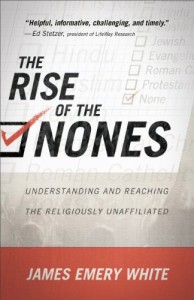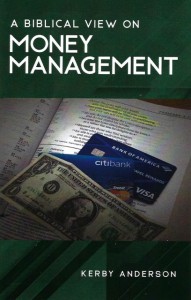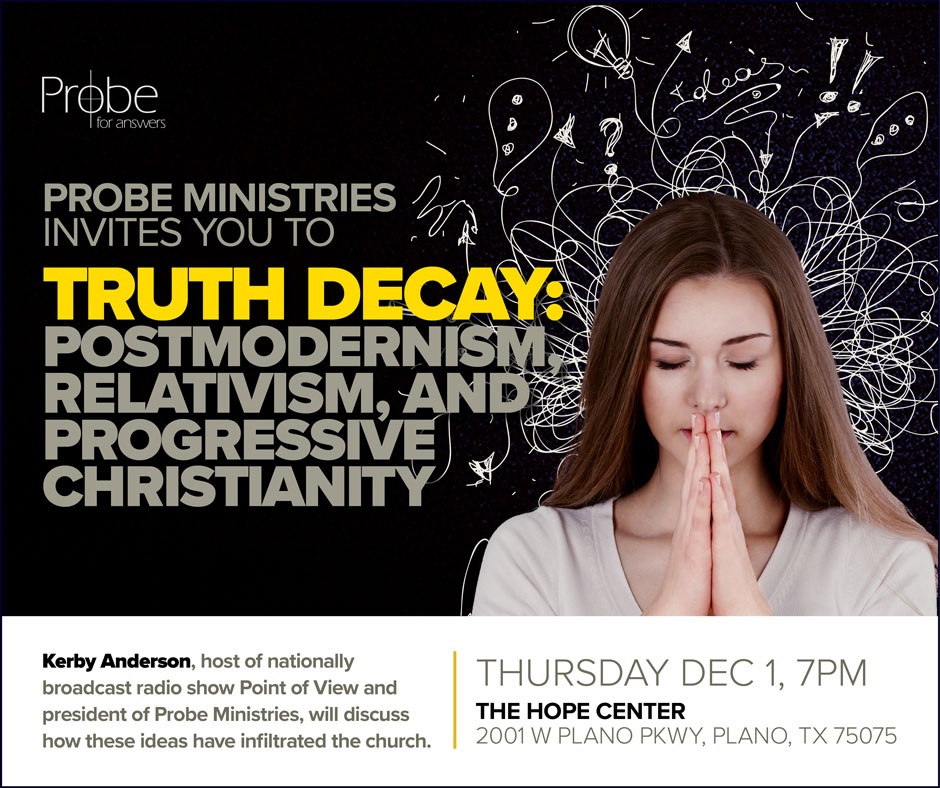Steve Cable addresses James White’s book The Rise of the Nones in view of Probe’s research about the church.
 Probe Ministries is committed to updating you on the status of Christianity in America. In this article, we consider James White’s book, The Rise of the Nones, Understanding and Reaching the Religiously Unaffiliated.{1} His book addresses a critical topic since the fastest-growing religious group of our time is those who check “none” or “none of the above” on religious survey questions.
Probe Ministries is committed to updating you on the status of Christianity in America. In this article, we consider James White’s book, The Rise of the Nones, Understanding and Reaching the Religiously Unaffiliated.{1} His book addresses a critical topic since the fastest-growing religious group of our time is those who check “none” or “none of the above” on religious survey questions.
 Let’s begin by reviewing some observations about Christianity in America.
Let’s begin by reviewing some observations about Christianity in America.
From the 1930’s{2} into the early 1990’s the percentage of nones in America{3} was less than 8%. But by 2012, the number had grown to 20% of all adults and appears to be increasing. Even more alarming, among those between the ages of 18 and 30 the percentage grew by a factor of three, from 11% in 1990 to nearly 32% in 2012.
Another study reported Protestantism is no longer the majority in the U.S., dropping from 66% in the 1960’s down to 48% in 2012.
The nones tend to consider themselves to be liberal or moderate politically, in favor of abortion and same-sex marriage being legal, and seldom if ever attend religious services. For the most part, they are not atheists and are not necessarily hostile toward religious institutions. However, among those who believe in “nothing in particular,” 88% are not even looking for a specific faith or religion.
One report concludes, “The challenge to Christianity . . . does not come from other religions, but from a rejection of all forms of organized religions. They’re not thinking about religion and rejecting it; they are not thinking about it at all.”{4} In fact, the 2011 Baylor survey found that 44% of Americans said they spend no time seeking “eternal wisdom,” and a Lifeway survey found that nearly half of Americans said they never wonder whether they will go to heaven.
As White notes, these changes in attitude come in the wake of a second major attack on traditional Christian beliefs. The first set of attacks consisted of:
1. Copernicus attacking the existence of God
2. Darwin attacking God’s involvement in creation, and
3. Freud attacking our very concept of a creator God.
The second storm of attacks focuses on perceptions of how Christians think in three important areas.
1. An over entanglement with politics linked to anti-gay, sexual conservatism, and abrasiveness
2. Hateful aggression that has the church talking in ways that have stolen God’s reputation, and
3. An obsession with greed seen in televangelist transgressions and mega-pastor materialism, causing distrust of the church.
These perceptions, whether true or not, create an environment where there is no benefit in the public mind to self-identifying with a Christian religious denomination.
Living in a Post-Christian America
A 2013 Barna study{5} shows America rapidly moving into a post-Christian status. Their survey-based study came to this conclusion: over 48% of young adults are post-Christian, and “The influence of post-Christian trends is likely to increase and is a significant factor among today’s youngest Americans.”{6}
White suggests this trend is the result of “three deep and fast-moving cultural currents: secularization, privatization, and pluralization.”{7}
Secularization
Secularization teaches the secular world is reality and our thoughts about the spiritual world are fantasy. White states: “We seem quite content to accept the idea of faith being privately engaging but culturally irrelevant.”{8} In a society which is not affirming of public religious faith, it is much more difficult to hold a vibrant, personal faith.
Privatization
Privatization creates a chasm between the public and private spheres of life, trivializing Christian faith to the realm of opinion. Nancy Pearcy saw this, saying, “The most pervasive thought pattern of our times is the two-realm view of truth.”{9} In it, the first and public realm is secular truth that states, “Humans are machines.” The second and private realm of spirituality states, “Moral and humane ideals have no basis in truth, as defined by scientific naturalism. But we affirm them anyway.”{10}
Pluralization
Pluralization tells us all religions are equal in their lack of ultimate truth and their ability to deliver eternity. Rather speaking the truth of Christ, our post-modern ethic tells us we can each have our own truth. As reported in our book, Cultural Captives{11}, about 70% of evangelical, emerging adults are pluralists. Pluralism results in making your own suit out of patches of different fabrics and patterns and expecting everyone else to act as if it were seamless.
White sums up today’s situation this way: “They forgot that their God was . . . radically other than man . . . They committed religion functionally to making the world better in human terms and intellectually to modes of knowing God fitted only for understanding this world.”{12}
This combination of secularization, privatization and pluralization has led to a mishmash of “bad religion” overtaking much of mainstream Christianity. The underlying basis of the belief systems of nones is that there is a lot of truth to go around. In this post-modern world, it is considered futile to search for absolute truth. Instead, we create our own truth from the facts at hand and as necessary despite the facts. Of course, this creates the false (yet seemingly desirable) attribute that neither we, nor anyone else, have to recognize we are sinners anymore. With no wrong, we feel no need for the ultimate source of truth, namely God.
If You Build It, They Won’t Come
We’ve been considering the beliefs and thinking of the nones. Can we reach them with the gospel, causing them to genuinely consider the case for Christ?
We are not going to reach them by doing more of the same. Statistics indicate that we are not doing a good job of reaching the nones.
As James White notes, “The very people who say they want unchurched people to . . . find Jesus resist the most basic . . . issues related to building a relationship with someone apart from Christ, . . . and inviting them to an open, winsome, and compelling front door so they can come and see.”{13}
Paul had to change his approach when addressing Greeks in Athens. In the same way, we need to understand how to speak to the culture we want to penetrate.
In the 1960’s, a non-believer was likely to have a working knowledge of Christianity. They needed to personally respond to the offer of salvation, not just intellectually agree to its validity. This situation made revivals and door-to-door visitation excellent tools to reach lost people.
Today, we face a different dynamic among the nones. “The goal is not simply knowing how to articulate the means of coming to Christ; it is learning how to facilitate and enable the person to progress from [little knowledge of Christ], to where he or she is able to even consider accepting Christ.”{14}
The rise of the nones calls for a new strategy for effectiveness. Today, cause should be the leading edge of our connection with many of the nones, in terms of both arresting their attention and enlisting their participation.
Up through the 1980s, many unchurched would respond for salvation and then be incorporated into the church and there become drawn to Christian causes. From 1990 through the 2000s, unchurched people most often needed to experience fellowship in the body before they were ready to respond to the gospel. Today, we have nones who are first attracted to the causes addressed by Christians. Becoming involved in those causes, they are attracted to the community of believers and gradually they become ready to respond to the gospel.
We need to be aware of how these can be used to offer the good news in a way that can penetrate through the cultural fog. White puts it this way, “Even if it takes a while to get to talking about Christ, (our church members) get there. And they do it with integrity and . . . credibility. . . Later I’ve seen those nones enfolded into our community and before long . . . the waters of baptism.”{15}
Relating to nones may be outside your comfort zone, but God has called us to step out to share His love.
Combining Grace and Truth in a Christian Mind
Every day we are on mission to the unchurched around us. James White suggests ways we can communicate in a way that the nones can understand.
We need to take to heart the three primary tasks of any missionary to an unfamiliar culture. First, learn how to communicate with the people we are trying to reach. Second, become sensitized to the new culture to operate effectively within it. Third, “translate the gospel into its own cultural context so that it can be heard, understood, and appropriated.”{16}
The growth of the nones comes largely from Mainline Protestants and Catholics, right in the squishy middle where there is little emphasis on the truth of God’s word. How can we confront them with truth in a loving way?
The gospel of John tells us, “Grace and truth came through Jesus Christ.”{17} Jesus brought the free gift of grace grounded in eternal truth. As we translate the gospel in today’s cultural context for the nones, this combination needs to shine through our message. What does it look like to balance grace and truth?
• If we are communicating no grace and no truth, we are following the example of Hinduism.
• If we are high on grace – but lacking in truth, we give license to virtually any lifestyle and
perspective, affirming today’s new definition of tolerance.
• On the other hand, “truth without grace: this is the worst of legalism . . . – what many nones
believe to be the hallmark of the Christian faith.” The real representative of dogma without grace is Islam.” In a survey among 750 Muslims who had converted to Christianity, they said that as Muslims, they could never be certain of their forgiveness and salvation as Christians can.
• Grace is the distinctive message of Christianity but never remove it from the truth of the high cost Christ paid. Jesus challenged the religious thought of the day with the truth of God’s standard. Recognizing we cannot achieve that standard, we are run to the grace of God by faith.
To communicate the truth, we need to respond to the new questions nones are asking of any faith. As White points out, “I do not encounter very many people who ask questions that classical apologetics trained us to answer . . . Instead, the new questions have to do with significance and meaning.” Questions such as, “So, what?” and “Is this God of yours really that good?”
We need to be prepared to “give a defense for the hope that is within us” in ways that the nones around us can resonate with, such as described in our article The Apologetics of Peter on our website.
Opening the Front Door to Nones
The nones desperately need the truth of Jesus, yet it is a challenge to effectively reach them. “Reaching out to a group of people who have given up on the church, . . . we must renew our own commitment to the very thing they have rejected – the church.”{18} The fact that some in today’s culture have problems with today’s church does not mean that God intends to abandon it.
The church needs to grasp its mandate “to engage in the process of ‘counter-secularization’. . . There are often disparaging quips made about organized religion, but there was nothing disorganized about the biblical model.”{19} We all have a role to play in making our church a force for the gospel in our community.
It must be clear to those outside that we approach our task with civility and unity. Our individual actions are not sufficient to bring down the domain of darkness. Jesus told us that if those who encounter the church can sense the unity holding us together they will be drawn to its message.
How will the nones come into contact with the unity of Christ? It will most likely be through interaction with a church acting as the church. As White points out, “If the church has a “front door,” and it clearly does, why shouldn’t it be . . . strategically developed for optimal impact for . . . all nones who may venture inside?”{20} Surveys indicate that 82 percent of unchurched people would come to church this weekend if they were invited by a friend.
One way we have a chance to interact with nones is when they expose their children to a church experience. Children’s ministry is not something to occupy our children while we have church, but is instead a key part of our outreach to the lost nones in our community. “What you do with their children could be a deal breaker.”
In today’s culture, we cannot overemphasize the deep need for visual communication. Almost everyone is attuned to visually receiving information and meaning. By incorporating visual arts in our church mainstream, “it has a way of sneaking past the defenses of the heart. And nones need a lot snuck past them.”{21}
We need to keep evangelism at the forefront. “This is no time to wave the flag of social ministry and justice issues so single-mindedly in the name of cultural acceptance and the hip factor that it becomes our collective substitute for the clear articulation of the gospel.”{22}
White clearly states our goal, “Our only hope and the heart of the Great Commission, is to stem the tide by turning the nones into wons.”{23}
Notes
1. James Emery White, The Rise of the Nones: Understanding and Reaching the Religiously Unaffiliated, Baker Books, 2014.
2. Katherine Bindley, “Religion Among Americans Hits Low Point, As More People Say They Have No Religious Affiliation: Report,” Huffington Post, March 1, 2012.
3. General Social Survey conducted over multiple years by the National Opinion Research Center and accessed through the Association of Religion Data Archives, www.TheARDA.com.
4. ARIS, “American Nones: The Profile of the No Religion Population”, Trinity College, commons.trincoll.edu/aris/fiiles/2011/08/NONES_08.pdf.
5. Barna Group, How Post-Christian is America?, 2013, barna.org/barna-update/culture/608-hpca.
6. Ibid.
7. White p. 46.
8. White p. 47.
9. Ibid, p. 121.
10. Ibid p. 109.
11. Stephen Cable, Cultural Captives: The Beliefs and Behavior of American Young Adults, 2012, p. 60.
12. James Turner, Without God, Without Creed: The Origins of Unbelief in America, Johns Hopkins Press, 1985.
13. White, p. 83.
14. White, p. 93.
15. White, p. 108.
16 White, p. 114.
17. John 1:15.
18. White, p. 155.
19. White, p. 169.
20. White, p. 152.
21. White, p. 163.
22 White, p. 180.
23. White, p. 181.
©2016 Probe Ministries

 It is always important for us to get out of debt. I have written another booklet on the subject of debt. If you are in debt or want to learn more about government debt and personal debt, I encourage you to obtain that booklet. Email me your name and address at
It is always important for us to get out of debt. I have written another booklet on the subject of debt. If you are in debt or want to learn more about government debt and personal debt, I encourage you to obtain that booklet. Email me your name and address at 